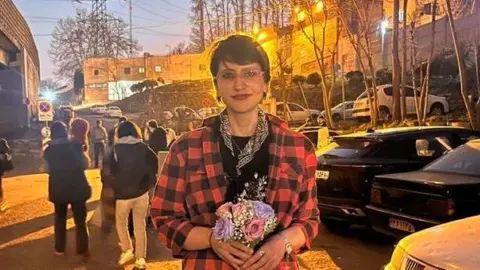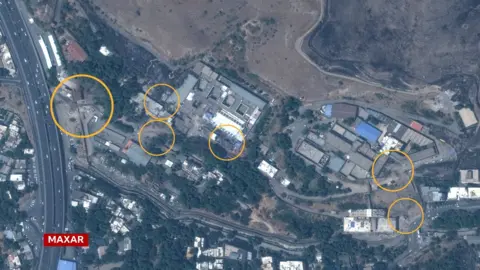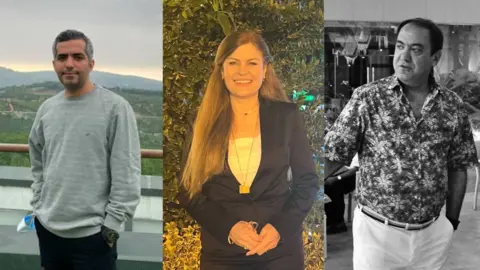“For me, hell was not the moment Israel attacked; hell was the moment they wouldn’t open the door [of the cell] for us,” Motahareh Goonei recalls in an exclusive interview with the BBC.
A political activist, Goonei was in solitary confinement in Iran’s notorious Evin Prison when it was hit in a targeted attack by Israel on 23rd June.
Satellite imagery, witness accounts and verified footage obtained by BBC News Persian reveal new details of the attack in the closing hours of the Israel-Iran war and of those who died.
The high-security complex, perched on the northern edge of Tehran, has held thousands of political prisoners over the past half-century. On that day in June, the prison became the site of the deadliest Israeli strike on Iranian soil in terms of civilian casualties.
Iranian authorities say 80 people were killed – among them prison staff, inmates, medical workers, visitors and residents of nearby neighbourhoods.
In a report published on 14 August, Human Rights Watch said that Israeli air strikes on the prison were unlawfully indiscriminate and amounted to an apparent war crime.
The Israel Defense Forces (IDF) said the reason for the attack was that the facility was being “used for intelligence operations against Israel”.
‘No way out’
Describing the moment explosions ripped through the compound, Goonei said: “When I heard the third blast, I was certain there was no way out. I just pounded on the door with all my strength, but it wouldn’t open. I thought ‘this is the end of your life – say goodbye’.”

Freed from her cell by another prisoner, Goonei stumbled into thick, choking smoke. She says that guards initially tried to block inmates from escaping, and some prison interrogators even threatened them.
Yet in scenes she described as “horrific but humanising”, prisoners rushed to help injured guards, calming a panicked female officer and bandaging the wounds of a crying interrogator.
Other inmates from another ward rushed to help doctors and nurses trapped in the prison clinic.
Saeedeh Makarem, a doctor who was badly injured in the strike, later wrote on Instagram: “The very prisoners I once treated saved my life.”
Another woman held in Evin, speaking on condition of anonymity due to fears for her safety, has described the moment of the attack to the BBC.
“At first there were several explosions in quick succession, and the noise went on for about two minutes.
“We stayed on our beds at first because the windows had shattered, then we got dressed and all helped to bring the older women downstairs. No-one from the prison helped us – they shut the door on us and said we couldn’t go out.’
Scale of the attack
BBC analysis indicates Israel attacked Evin with at least six projectiles, damaging at least 28 buildings inside the complex.

The IDF says it had conducted a “targeted strike” on “a symbol of oppression against the Iranian people” and claimed that measures were taken to minimise harm to civilians.
But a relative of a political prisoner who arrived to visit just minutes after the blasts said “those coming out of the prison were saying there were bodies everywhere. Some prisoners had come out, none of them trying to escape — just stunned.”
Iranian authorities say 75 inmates fled during the chaos. Some were later recaptured or returned voluntarily.
Identifying victims
Iranian officials say that of the 80 people killed in the attack, 42 were prison staff and five were inmates. Only the names of the staff have been released.
BBC News Persian has independently verified the identities and the circumstances surrounding the deaths of three of the victims through interviews with their relatives. They are:
- Masoud Behbahani, a dual Iranian-American citizen, who was being held on financial charges. His family were given conflicting accounts of his death from the Iranian Prisons Organisation.
- Arvin Mohammadi, 37, killed in the administrative building while posting bail for his father’s temporary release from prison during the war
- Mehrangiz Imanpour, 61, a prominent artist and painter, killed by shrapnel
Among the other victims killed in the attack were a local mother of a one-year-old child, a philanthropist visiting to arrange a prisoner’s release, five social workers, 13 young military conscripts, and the five-year-old child of one of the social workers.
After the attack on Evin Prison, the fate of transgender prisoners remains unknown. Some media reports claimed that 100 transgender inmates had been killed, but BBC Persian’s investigation reveals that this is not true.
Reza Shafakhah, a lawyer in Iran who has been following the situation of transgender prisoners, told the BBC: “There are serious concerns about their situation. No-one knows where these prisoners are now.”

Why target Evin?
Israel alleged the prison was being used for “intelligence operations [against it], including counter-espionage”. It has not responded to questions from the BBC about the exact targets or weapons used, or whether it anticipated civilian deaths.
A month after the attack, Amnesty International published a report into the incident.
“Directing attacks at civilian objects is strictly prohibited under international humanitarian law. Carrying out such attacks knowingly and deliberately constitutes a war crime,” said Erika Guevara Rosas, Senior Director for Research, Advocacy, Policy and Campaigns at Amnesty.
The UN human rights office stated Evin was “not a military objective” and the attack violated international humanitarian law.
DISCLAIMER: The Views, Comments, Opinions, Contributions and Statements made by Readers and Contributors on this platform do not necessarily represent the views or policy of Multimedia Group Limited.
DISCLAIMER: The Views, Comments, Opinions, Contributions and Statements made by Readers and Contributors on this platform do not necessarily represent the views or policy of Multimedia Group Limited.
Source: myjoyonline.com










